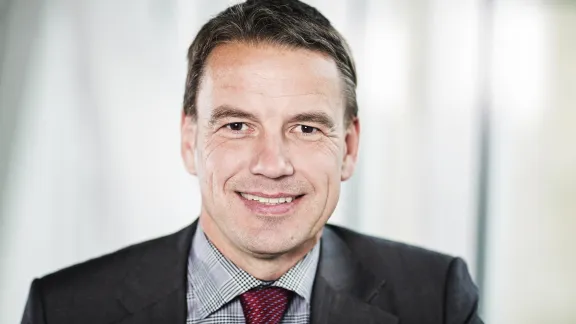
Danish Minister for Development Christian Friis Bach © Ulrik Jantzen
Danish Minister Christian Bach Urges More Aid for Refugees and Host Communities
(LWI) - The Danish Minister for Development Cooperation Christian Friis Bach accompanied Crown Princess Mary on a visit in August to the Za’atri refugee camp in Jordan, where The Lutheran World Federation (LWF) supports Syrians fleeing the conflict that started at home more than two and a half years ago.
In an interview with Lutheran World Information (LWI), Bach, who served the LWF on the Standing Committee for World Service from 2005 to 2011, shared his impressions on humanitarian organizations’ work at Za’atri camp, currently home to more than 120,000 people. Jordan hosts over 525,000 refugees from Syria.
LWI: What was your impression of the quality of services provided at the camp? What challenges did refugees cite, and any suggestions in addressing some of them?
It is my clear impression that the quality of services provided in the camp is very good indeed. Shelter, food, protection, schools, child-friendly spaces and health facilities seem to be well established and well run, contrary to the situation during my first visit to the camp a year ago.
Some of the main challenges in Jordan stem from the fact that up to 80 percent of the refugees live outside the camps—in rented rooms in cities. They compete with Jordanians for jobs and accommodation, and they pose an enormous challenge to the Jordanian service sector (education, health, water etc.).
In Lebanon, refugees and host communities experience all of the same challenges, but perhaps at an even greater scale. Hence, nowadays 20 percent of the population in the country consists of Syrian refugees. And the latest is that northern Iraq is finding itself in much the same situation with an influx of more than 60,000 refugees during the past three weeks [in August]. In order to assist these countries in addressing the huge challenges and in avoiding conflicts between local communities and refugees, the international community must provide more aid, not only to refugees but also to the host communities.
What do you see as the most critical role of government today in facilitating the work of international humanitarian organizations (NGOs) including faith-based non-governmental organizations such as the LWF?
The role of the government is twofold. First, we need to keep up the pressure on Syria and armed groups in Syria to protect civilians and respect international human rights and humanitarian law. This includes allowing humanitarian access for all humanitarian actors to all people in need. Secondly, we need to provide funding for assistance to reach everyone in need, i.e. conflict-affected communities and internally displaced in Syria, refugees outside of Syria and host communities where refugees have lived for some time now and may have to stay for a long time still to come.
How can the partnership between governments, civil society and international organizations be strengthened in order to promote the human rights of all refugees?
Relief efforts must be well coordinated between all the actors on the ground, including governments, civil society organizations and international organizations. The cluster coordination system where a United Nations organization in collaboration with other humanitarian actors takes the lead in coordinating different relief efforts within different sectors (clusters) is very useful. It is my strong hope that all humanitarian actors participate in this coordination system in order to ensure timely prioritization and efficient allocation of available resources. Partnerships are also about sharing information efficiently, including with regard to humanitarian needs and human rights, in order to facilitate appropriate responses based on the comparative advantage of the different types of humanitarian actors.
Another important tool for helping to improve the human rights of vulnerable people is to ensure that humanitarian actors are able to live up to the humanitarian principles and agreed minimum standards in their programs. We are, for the same reason, supporting ongoing efforts within the non-governmental organization community to develop joint standards and appropriate certification systems.


